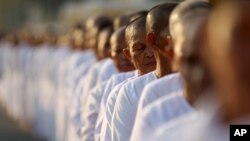Voters surveyed by VOA Khmer have said they saw only harm coming from the ongoing breakdown in relations between the ruling Cambodian People’s Party and the opposition Cambodia National Rescue Party.
Relations between the parties are at a low not seen since mass street protests in the wake of the 2013 general election paralyzed the capital. In recent weeks four human rights workers and an election official have been detained on bribery-related charges, while another election official selected by the opposition for the post is also facing a costly legal battle, which opposition supporters say is politically motivated.
Kem Sokha, the CNRP’s acting president while its leader, Sam Rainsy, remains in self-imposed exile, has avoided arrest until now, but is wanted for questioning for solicitation and missing court appearances.
Voters on Wednesday said they expected nothing positive to come from the recent developments.
Ouk Tath, a retired NGO worker, said the older generation, who had witnessed near total societal breakdown under the Khmer Rouge, desired only peace, and warned of the dangers of resorting to the politics of fear and division.
He added that since Cambodia held its first democratic elections in 1993, politicians had turned from fighting for power with arms to fighting for people’s votes.
“However, after the elections, they started to fight each other for power again,” he said.
Tath, 79, firmly believes in the power of dialogue, and urged the two parties to once more hold negotiations to end the tension, rather than continue to serve their own interests at the expense of the people they are supposed to represent.
“They should change their mentality to pave the way for negotiations to serve the public interest. However, these days they are not talking.”
A coal seller from Kampong Speu province, Sao Song, 36, appealed to the government to focus on improving rural infrastructure.
“I want to see the nation develop with new bridges built and ponds dug for the rural people,” he said. “When they [politicians] talk and reconcile, it benefits the people. But if they still argue with each other, it’s hard.”
Chea Phirum, 39, a food vendor in Phnom Penh, said the government had made some advances, but was critical of its human rights record.
“I see that the government has helped people in some ways, while they have been inactive in some others. Nowadays the government does respect human rights but not the same as other nations. I don’t like it this way. If they are locked in a dispute with one another, the people are not happy and the nation cannot progress.”
Chatting over coffee at a popular Phnom Penh café, Prum Sothy, 60, a tuk tuk driver, said he expected free and fair elections in 2018.
“I want peace. I want to see a free and fair election in Cambodia, without any intimidation. People have the right to freedom of expression. The people are the ones who fall victim whenever there's a dispute between political parties.”
Another Phnom Penh resident, who asked not to be named for security reasons, asked how ordinary people could expect to be treated if the government was willing to target rights workers and even lawmakers.
“Since the 2013 election up till now, those who won the elections did not do much to earn the people's trust. They are just locked in dispute and fight for power without thinking about the nation's interest. The people want a true democracy. They want freedom and peace without robberies, murder and oppression. They want the nation to be strong and a stop to the free-flow of foreigners into the nation,” the resident said.
Kem Ley, founder of the Grassroots Democracy Party, said that while there are always disputes in democracies, when one side decides it “cannot win the argument and resorts to arrests and causing injuries, that’s wrong… Disputes in parliament are normal.”
“The ruling party should implement the policies it committed to before the elections. But the thing is that there's not much success. Deforestation still goes on, corruption and nepotism are still ripe. The things that they promised to eradicate before the elections have actually become worse. The big issues remained unsolved, such as land disputes, Vietnamese immigrants and so on,” said Ley.








